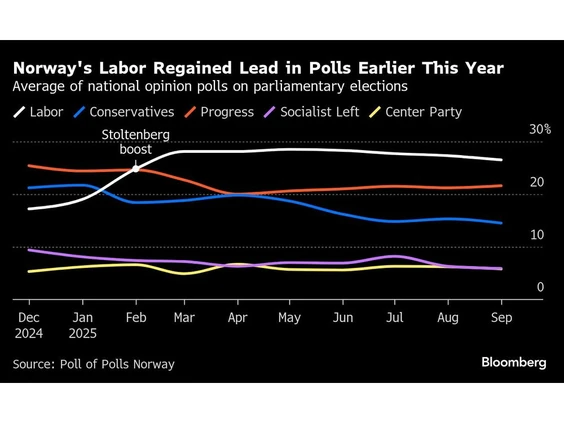Norway is heading to the polls Monday in a closely watched election that could reshape wealth taxes, energy policy, and the country’s $2 trillion sovereign fund. Investors and businesses are closely monitoring the outcome as economic and political shifts could affect key sectors.
Labor Prime Minister Jonas Gahr Store is seeking to stay in power. He gained momentum this year after former NATO head Jens Stoltenberg returned to government. Geopolitical tensions and disputes with the U.S. administration have also helped boost Store’s support.
Store has faced criticism from Norway’s business groups and right-leaning parties. They argue that his wealth tax policies hurt businesses and economic growth. Meanwhile, the Conservative Party led by former Premier Erna Solberg is polling at its lowest since the 2008 financial crisis. Store sees the populist Progress Party, led by Sylvi Listhaug, as his main rival.
Currently, Store leads a minority government after the Center Party left the coalition in January. Labor may try to govern alone with support from smaller left-wing parties. Voting will close at 9 p.m. Monday, and analysts say the results could have broad effects on taxes, fund investments, and the energy sector.
Recent tax measures have targeted wealth and dividends to reduce inequality and close loopholes. Critics say these policies have led some of Norway’s richest citizens to leave the country. DNB Bank ASA estimates that up to 500 wealthy individuals have relocated. Startups are also considering moving or hiring abroad after a 2024 change to exit taxes on capital gains. This mirrors trends seen in other parts of Europe.
The Progress Party wants to eliminate the wealth tax, currently 1.1% on fortunes over 20 million kroner ($2 million). The Conservatives and two smaller right-leaning parties have promised a partial repeal, mainly on shares and fixed assets. Store’s cabinet argues that investments have not slowed and warns that reducing the wealth tax could create a budget gap that would need to be filled by other business levies. Economic growth outside the oil and gas sector is expected to rise to 1.6% in 2025, up from 0.6% in 2024. The benchmark stock index has risen 14% so far this year, outpacing Europe’s Stoxx 600.
Both the Progress Party and Conservatives want Norway’s $2 trillion sovereign fund to invest in companies involved in the nuclear arms sector, including BAE Systems, Airbus, and Safran. These firms are currently excluded on ethical grounds. The change aligns with Europe’s increased defense spending amid the Russia-Ukraine conflict and shifting U.S. support. The fund has also faced controversy in the U.S. It recently divested several Israeli companies linked to the Gaza conflict and removed Caterpillar Inc., drawing criticism from Republican Senator Lindsey Graham.
Norway’s major parties agree that oil and gas drilling should continue to maintain energy security and slow the decline of hydrocarbon resources. Store’s Labor Party supports more exploration, but smaller parties favor a faster transition to renewables. Efforts to reduce environmental impacts are ongoing. Subsea power cables to offshore platforms cut emissions and help Norway meet climate targets. A major project in Hammerfest, operated by Equinor ASA, will use electricity from wind and water to replace natural gas turbines, reducing carbon emissions by 2% last year. Opponents, including the Progress Party, argue that electrification will raise electricity costs in northern regions. A policy reversal could increase costs for Equinor and challenge further Barents Sea developments.
The wealth fund currently contributes around 20% of Norway’s budget. Spending this year is set at 2.7% of the fund, below the 3% fiscal limit. While both the Progress Party and Conservatives want to cut public spending, analysts expect expansive budget policies to continue under any government. The central bank cut its main deposit rate to 4.25% in June and may reduce it again this month. Since June, the krone has weakened more than 2% against the euro. The election’s outcome could influence Norway’s economic and investment landscape in the years ahead.

